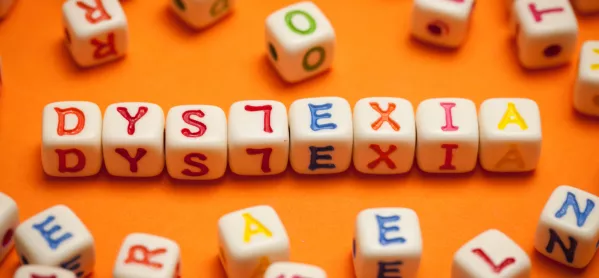- Home
- The danger of excluding dyslexic students from T levels
The danger of excluding dyslexic students from T levels

Most T-level providers will require at least a GCSE grade 4 in maths and English, recent research from Tes shows. This is a massive disappointment for young dyslexics.
T levels should have been an opportunity for people with dyslexia to get into areas where they can play to their strengths but now it’s looking like thousands will be excluded from them.
Investigation: Welcome to education’s newest exclusive club: T levels
News: What grades will be required to study the new T levels?
Background: T levels: What are they and how will they work?
A young dyslexic is half as likely as their peers to get a grade 4 or above in GCSE English and maths - around 65 per cent will not get the required grades.
While English language and literature can often be innately harder for someone who has dyslexia, this chasm in results is predominantly caused by lack of funding for dyslexia diagnosis and support combined with an obsession with unaided spelling, punctuation and grammar.
T levels and dyslexia
Many dyslexics suffer in the education system but go on to flourish in mainstream subjects once properly supported and able to show their skills in more pragmatic ways.
However, alternative routes are particularly crucial to young people with dyslexia for two reasons.
Firstly, many people with dyslexia find mainstream education and its rigid assessment methods incredibly difficult. This has nothing to do with their underlying ability and, in the right environment, they go on to be successful.
Secondly, subjects that have a less of a focus in the mainstream curriculum and are more valued in alternative routes - and often lead to great jobs - are commonly where dyslexic strengths can be a real advantage.
Across many of the areas included in T levels, we see much higher levels of people with dyslexia than in the general population. We also see dyslexia, instead of being a barrier, becoming an advantage because of its strength in working with visual-spatial information and complex problem-solving.
What we frequently see is dyslexics struggling through GCSE English and maths exams but excelling in exactly the subjects the T levels are focusing on.
That is why we welcomed the principle of T levels: it gives a route to a rigorous education across many areas where people with dyslexia shine. This is also why it is incredibly disappointing to discriminate in entry requirements against young people with dyslexia.
‘Demoralising’ resits
The government is aware that having a pragmatic approach to English and maths when assessing entry to courses is important. This is reflected in the Department for Education recently removing additional computerised English and maths entry tests for trainee teachers, advocating these skills being assessed as part of the wider ITT.
While the government suggests a transitional programme for those students who don’t have the entry level, it is not a given that repeating the same process over and over, expecting a different result, will get young people with dyslexia over the grade 4 hurdle. What is certain is it will be demoralising and discourage applications, not to mention adding an additional burden of study that their non-dyslexic peers don’t have.
As the mainstream curriculum is made more and more dyslexia-unfriendly, it is more crucial than ever to have a viable alternative route for those who wish to pursue one.
There are people with dyslexia performing leading work across the subjects that the T levels focus on and making an immeasurable contribution to Britain, so why are we restricting their entry to these careers arbitrarily? We run a serious risk of losing our future workforce in these key sectors.
While written communication is undoubtedly important and maths is important to many T-level subjects, equalling this to a grade 4 or above in English and maths GCSEs is comparing apples to oranges.
This is set to be further exacerbated by changes in marking for functional skills, meaning that pupils using assistive technology will lose up to 45 per cent of marks for SPaG - disadvantaging many students with disabilities, not just dyslexics.
Unreflective of real workplaces
No workplace is going to ask an employee to write without access to technology that will check spelling and grammar, and a dyslexic employee will be entitled to a range of assistive technology that can manage the specific challenges that dyslexia can bring in this area.
So why are we judging someone on a handwritten exam that is total unreflective of real workplaces?
Assessing relevant communication and maths skills as part of the course is important. Putting up a largely irrelevant barrier for the 65 per cent of people with SEND that fail to get a grade 4 or above in English and maths GCSE is bad for education and business.
To no one’s benefit, this approach leaves able people with dyslexia without avenues to achieve their potential.
Helen Boden is the CEO of the British Dyslexia Association
Keep reading for just £1 per month
You've reached your limit of free articles this month. Subscribe for £1 per month for three months and get:
- Unlimited access to all Tes magazine content
- Exclusive subscriber-only stories
- Award-winning email newsletters